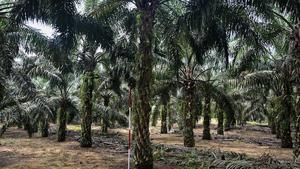 This photo taken on Feb 13, 2019 shows palm oil trees at the Malaysian Palm Oil Board (MPOB) research station in Bukit Lawiang in southern Johor state. (MOHD RASFAN / AFP)
This photo taken on Feb 13, 2019 shows palm oil trees at the Malaysian Palm Oil Board (MPOB) research station in Bukit Lawiang in southern Johor state. (MOHD RASFAN / AFP)
KUALA LUMPUR - The World Trade Organisation (WTO) agreed to a request from Kuala Lumpur to establish a panel examining a European Union law that restricts the use of palm oil-based biofuels, Malaysia's government and a Geneva-based trade source said on Monday.
Under the EU's renewable energy directive, palm oil-based fuels are to be phased out by 2030, since palm oil has been classified by the bloc as resulting in excessive deforestation and can no longer be considered a renewable transport fuel.
Palm oil producers say some EU member states have started to phase it out ahead of the deadline.
Under the EU's renewable energy directive, palm oil-based fuels are to be phased out by 2030, since palm oil has been classified by the bloc as resulting in excessive deforestation and can no longer be considered a renewable transport fuel
ALSO READ: Malaysia's top supermarket chain bans 'palm-oil-free' products
Malaysia, the world's second-largest palm oil producer, and bigger rival Indonesia, have in recent years launched separate cases with the WTO, saying the EU measures are discriminatory.
"Malaysia will remain committed to pursuing legal action against the EU," Malaysia's Commodities Minister Mohd Khairuddin Aman Razali said. Malaysia and Indonesia together produce 85 percent of the world's palm oil.
In a statement, Mohd Khairuddin said the WTO on Friday acceded to a second request from Malaysia that a panel be set up. The application was made since consultations with the EU on March 17 failed to yield a solution, he said.
READ MORE: Malaysia to escalate EU palm oil dispute at WTO
The trade source, who attended the meeting on Friday, confirmed the decision to set up the panel. The source declined to be named because of the sensitivity of the matter.
At the closed-door meeting, an EU representative said its measures were fully justified and expressed confidence in prevailing during the proceedings, according to the source.
WTO panels typically deliberate for about six months before sending their findings to members. Any decision can be appealed.


